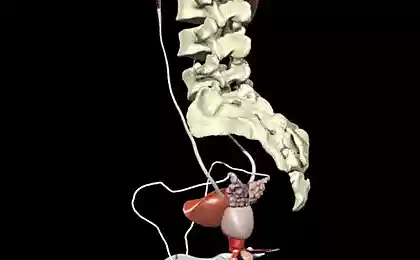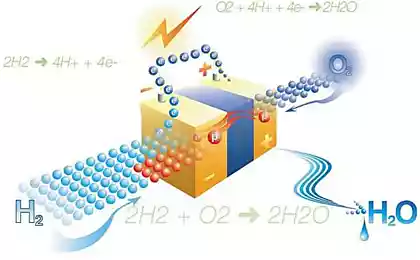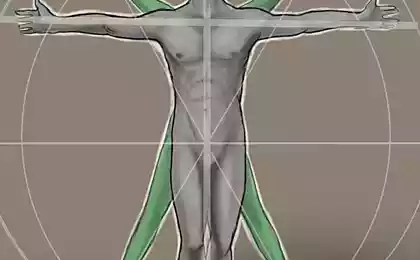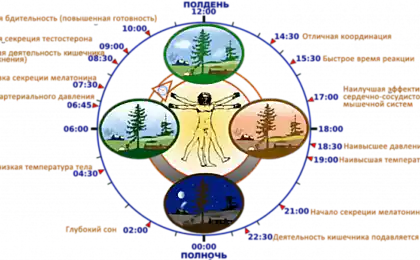515
WHAT happens in our bodies when we experience fear
In our culture there is an amazing psychological phenomenon: we are often ashamed of such emotions as anxiety or fear.
In General, the habit of modern man has any emotions attributed to embarrassing can look rather strange, after all, since our emotions are, so too we humans work, and why we need these emotions.
But the anxiety and fear a special function: they signal us that we are faced with some danger, and give us the energy for the necessary actions. This is a crucial function for survival, we are born with the ability to feel fear.
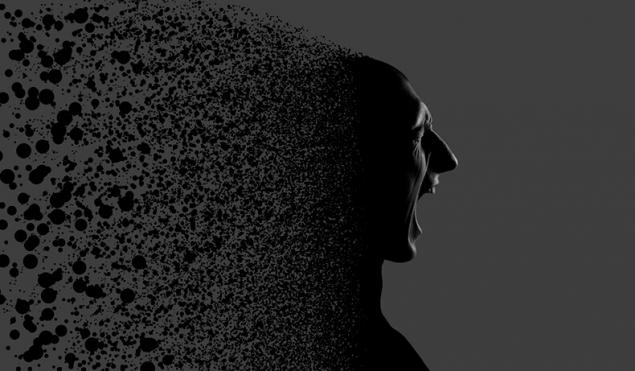
In contrast to, say, feelings of shame, which is formed by upbringing rather than due to our human nature (at least for most psychologists).
First of all, we are born with the ability to test the reaction of fright: it's a reflex that we react to a sudden intense stimulus, e.g., the sharp loud sound. While the body is bent, flexed knees, the shoulders rise, the head moves forward, the eyes blink. This is a reflex, that is, this reaction occurs before the person has time to understand the situation and assess the real level of danger.
At first we react with a reaction of fear, and then there is the emotion associated with the understanding of what is happening. If the situation really is dangerous, there will be fear, if there is no real danger, there may be a curiosity or irritation, if the person in childhood ridiculed for reaction of fear, it will be a shame.
Since it is the reflex reaction of fear does not depend on the "cowardly" person, or "the bold", and depends on the lability of the nervous system, so regardless of how fast and intense mental processes. Of course, if by profession, some harsh sounds cease to be unusual, these sounds include everything less reflex. For example, for a member of the gunshots cease to be unusual and therefore, the reaction of fear to the sounds decreases and is replaced with the same response, who trains professionally. But the reflex saved on all the other sudden stimuli.
Much more pronounced are physiological changes in the sense of fear that differs from the reaction of fear awareness of a real danger. For the internal organs is responsible of the autonomic nervous system, which, firstly, is Autonomous, that is, inaccessible to conscious control, and secondly, is divided into two divisions: the sympathetic nervous system and parasympathetic.
The sympathetic nervous system responsible for mobilizing the body for fight danger, and the parasympathetic for digestion and assimilation of food. With the fear aktiviziruyutsya sympathetic nervous system.
Its activity is needed in order to prepare the body to fight the danger or to escape, as the mechanism of fight-flight is a natural biological reaction to danger.
The heart rate increases to more blood flowing to muscles, peripheral blood vessels are compressed to provide a high blood pressure. Due to the reduction in peripheral vascular man pales. Since the reduction of surface vessels there is a threat of frost, you can often see a tremor in the body that helps release heat, as well as "hair-raising" to keep warm.
Breathing quickens and becomes deeper, so that the blood is saturated with oxygen. Pupils are narrowed to better see the danger, and his eyes open wide to increase survey space and see ways to escape. In order for the body not the processes that prevent the fight, reduced internal hollow organs — frequent urination and a desire to empty the bowel.
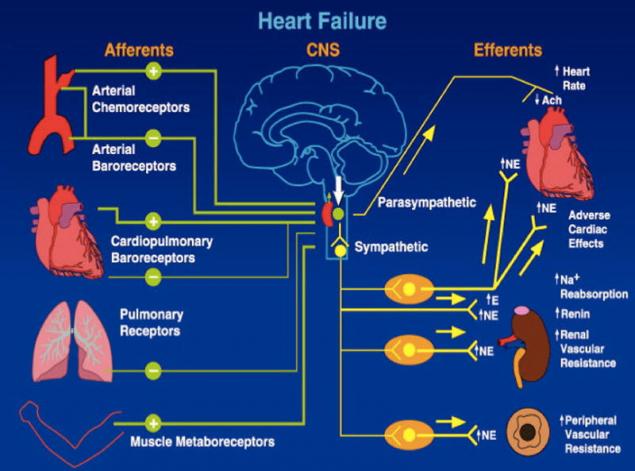
Digestion is also suspended. The sympathetic and parasympathetic systems are opposite in their activity, and activation of sympathetic nervous system inhibits parasympathetic. This leads to the fact that when you fear loss of appetite and may appear dry mouth, as salivation is blocked as well as the secretion of gastric juice.
If you are not very pronounced activity of the sympathetic nervous system, it does not block the parasympathetic, and the appetite persists. Moreover, the activity of the parasympathetic nervous system can in turn several to inhibit the sympathetic system, that is to reduce anxiety. Therefore, the alarm sometimes "seize".
Although, of course, is "jamming" alarm due not only to the purely physiological mechanisms. As in infancy when an alarm occurs we ate (baby is given the breast when he cries, because in order to feel safe, he should feel the mother's affection), food is associated with safety.
The sympathetic nervous system is active not only in fear, but in anger, and described physiological responses are not specific to fear, and the total for the mobilization of the body.
Tony Robbins: Words can change the brain
Awesome about the proportions of the human body
The emotion that a person experiences in the face of danger, does not depend on the autonomic nervous system, and how this risk is assessed. If we regard the danger as overwhelming fear, if we think that we are able to deal with this threat, we tend to experience angerthat pushes us to attack and fight. In this sense, our response to the threat depends on how we estimate our own strength.published
Source: www.kineziology.ru/readarticle.php?article_id=34
In General, the habit of modern man has any emotions attributed to embarrassing can look rather strange, after all, since our emotions are, so too we humans work, and why we need these emotions.
But the anxiety and fear a special function: they signal us that we are faced with some danger, and give us the energy for the necessary actions. This is a crucial function for survival, we are born with the ability to feel fear.

In contrast to, say, feelings of shame, which is formed by upbringing rather than due to our human nature (at least for most psychologists).
First of all, we are born with the ability to test the reaction of fright: it's a reflex that we react to a sudden intense stimulus, e.g., the sharp loud sound. While the body is bent, flexed knees, the shoulders rise, the head moves forward, the eyes blink. This is a reflex, that is, this reaction occurs before the person has time to understand the situation and assess the real level of danger.
At first we react with a reaction of fear, and then there is the emotion associated with the understanding of what is happening. If the situation really is dangerous, there will be fear, if there is no real danger, there may be a curiosity or irritation, if the person in childhood ridiculed for reaction of fear, it will be a shame.
Since it is the reflex reaction of fear does not depend on the "cowardly" person, or "the bold", and depends on the lability of the nervous system, so regardless of how fast and intense mental processes. Of course, if by profession, some harsh sounds cease to be unusual, these sounds include everything less reflex. For example, for a member of the gunshots cease to be unusual and therefore, the reaction of fear to the sounds decreases and is replaced with the same response, who trains professionally. But the reflex saved on all the other sudden stimuli.
Much more pronounced are physiological changes in the sense of fear that differs from the reaction of fear awareness of a real danger. For the internal organs is responsible of the autonomic nervous system, which, firstly, is Autonomous, that is, inaccessible to conscious control, and secondly, is divided into two divisions: the sympathetic nervous system and parasympathetic.
The sympathetic nervous system responsible for mobilizing the body for fight danger, and the parasympathetic for digestion and assimilation of food. With the fear aktiviziruyutsya sympathetic nervous system.
Its activity is needed in order to prepare the body to fight the danger or to escape, as the mechanism of fight-flight is a natural biological reaction to danger.
The heart rate increases to more blood flowing to muscles, peripheral blood vessels are compressed to provide a high blood pressure. Due to the reduction in peripheral vascular man pales. Since the reduction of surface vessels there is a threat of frost, you can often see a tremor in the body that helps release heat, as well as "hair-raising" to keep warm.
Breathing quickens and becomes deeper, so that the blood is saturated with oxygen. Pupils are narrowed to better see the danger, and his eyes open wide to increase survey space and see ways to escape. In order for the body not the processes that prevent the fight, reduced internal hollow organs — frequent urination and a desire to empty the bowel.

Digestion is also suspended. The sympathetic and parasympathetic systems are opposite in their activity, and activation of sympathetic nervous system inhibits parasympathetic. This leads to the fact that when you fear loss of appetite and may appear dry mouth, as salivation is blocked as well as the secretion of gastric juice.
If you are not very pronounced activity of the sympathetic nervous system, it does not block the parasympathetic, and the appetite persists. Moreover, the activity of the parasympathetic nervous system can in turn several to inhibit the sympathetic system, that is to reduce anxiety. Therefore, the alarm sometimes "seize".
Although, of course, is "jamming" alarm due not only to the purely physiological mechanisms. As in infancy when an alarm occurs we ate (baby is given the breast when he cries, because in order to feel safe, he should feel the mother's affection), food is associated with safety.
The sympathetic nervous system is active not only in fear, but in anger, and described physiological responses are not specific to fear, and the total for the mobilization of the body.
Tony Robbins: Words can change the brain
Awesome about the proportions of the human body
The emotion that a person experiences in the face of danger, does not depend on the autonomic nervous system, and how this risk is assessed. If we regard the danger as overwhelming fear, if we think that we are able to deal with this threat, we tend to experience angerthat pushes us to attack and fight. In this sense, our response to the threat depends on how we estimate our own strength.published
Source: www.kineziology.ru/readarticle.php?article_id=34
